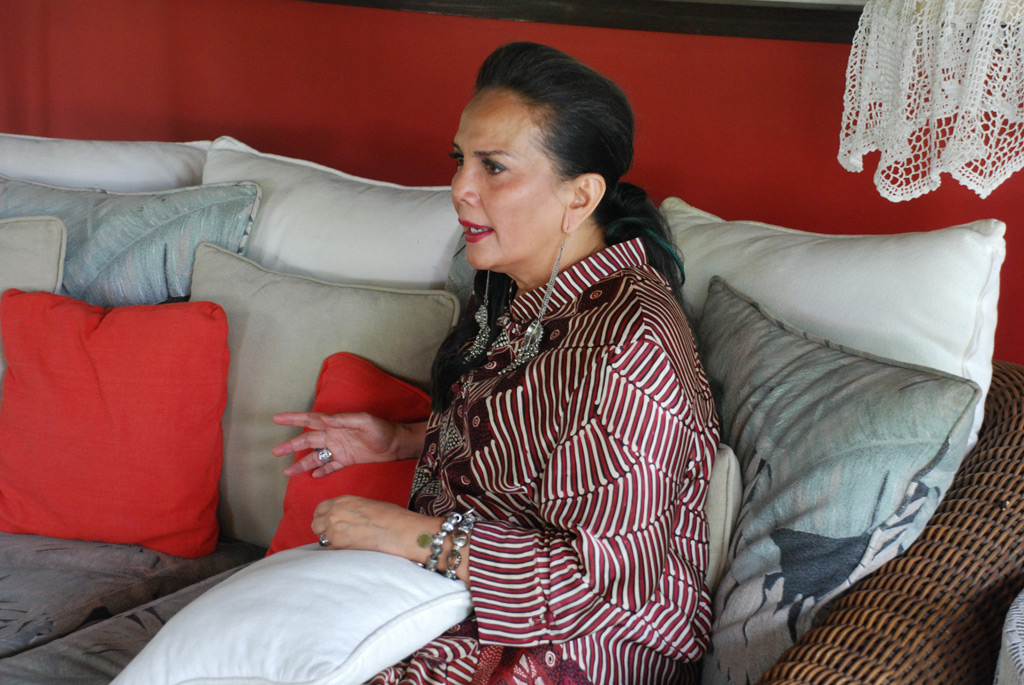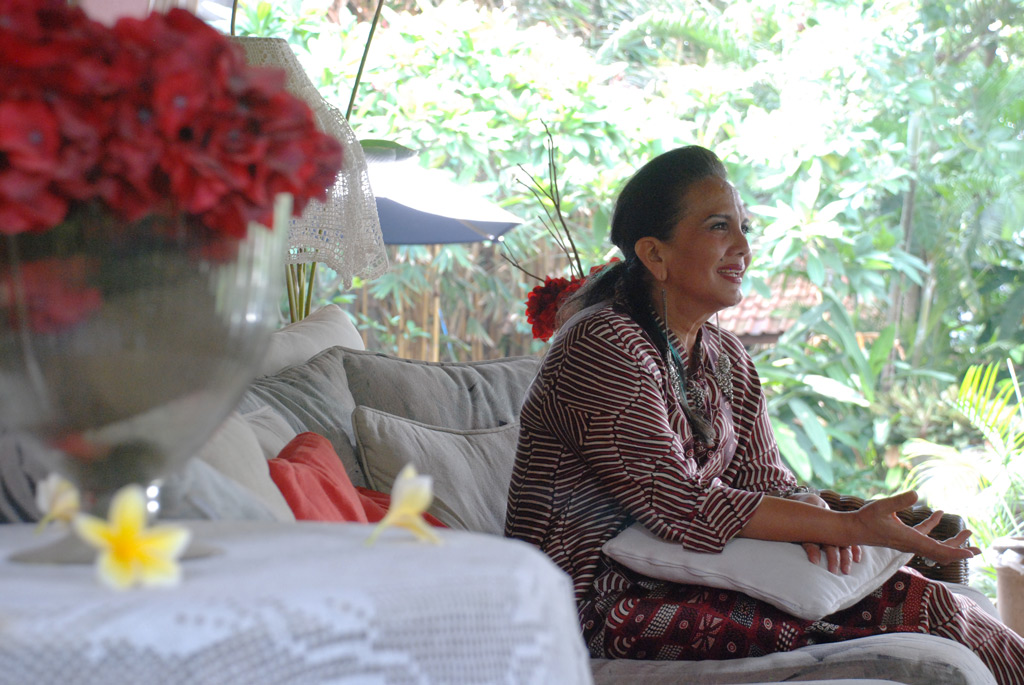A Festival of Films with Christine Hakim
Muhammad Hilmi (H) interviews actress and producer Christine Hakim (C).





















H
What are the goals of Festival Film Indoesia (FFI) and would you say that FFI has had a role in helping the Indonesian film industry grow? If so, how?
C
The very first FFI was held in 1955. Its initiator was the father of Indonesian cinema, H. Usmar Ismail. The main mission of FFI was to enliven, as well as grow an appreciation of the movie industry of Indonesia. As an award-event, it intended to be the barometer and also a motivator for the people in this industry to be the best at what they do. On the other side, FFI also hoped that this kind of event will encourage people to love local films.
Starting from 1973, FFI took place in different cities every year. We did that because Indonesia is a very big country. By choosing a different city for every festival, we hope that people from the movie industry would be able to communicate with locals.
The result of FFI is real and proven already. And we can see how films that won awards in FFI are also appreciated on an international level. Countries from Asia, Europe and America brought some of our films to be screened both in their cinemas and on television.
The government was also very supportive at that time. During the Soeharto era, there was a policy that stated – any company who imports five foreign movies had the obligation to produce one national film. This policy increased the number of national films remarkably.
Now, even if the support from the government is minimal, the number of local movies is quite good. Foreign movies might steal the attention from the people, but I think it only happens in big cities. In other areas, I still believe that Indonesian movies are the ones that resonate with the locals.
H
Because Indonesian films are more relatable?
C
Exactly. Many people will say that Indonesian movies are tacky and all, but no matter what, they are always the ones that the public can relate to. Indonesia has a very large number of people and with that, a big market for local films.
The thing is, the government was also responsible for destroying it. During the era of Harmoko (a Minister of Information during the Soeharto era), he announced the regulation regarding the import policy of foreign movies: through one door only. This law created an oligopoly that made a few number of people control the whole movie industry, including movie theatres and imported films. This particular policy is also one of the main reasons for the massive decline in the Indonesian movie industry. Not long after they validated the rules, certain theaters got out of business and the same thing happened to the movies; the number of Indonesian movies and theaters decreased drastically. It also came to a point where we didn’t have any local films at all for several years. With that condition, FFI also disappeared.
H
So, that’s the reason why FFI stopped in the late 80’s?
C
Definitely. We had close to zero Indonesian movies. Garin Nugroho might be the only director who was still making movies at the time. We can say that Garin Nugroho is the one and only person who kept the Indonesian film industry alive in that era.
Years later, the Indonesian movie industry started to repair itself. Still without the support from the government, a young generation of filmmakers built their own Indonesian movie industry. My first movie as a producer, “Daun di atas Bantal” was a part of this restoration. Winning the Asian Pacific Film Festival, this movie somehow reanimated the movie industry. Soon after “Daun di Atas Bantal”, other local films emerged including “Kuldesak”, “Ada Apa dengan Cinta”, and “Pasir Berbisik”. After that, the industry became active once again, until now.
The fact that local films pay the same amount of tax in the country as the foreign ones is a testament to how it is undervalued. Films can be a cultural currency. India produces more than a thousand local movies in a year, I can’t see why Indonesia cannot achieve that. Today, the peak number of Indonesian box office is less than 5 million viewers. Considering Indonesia has more than 200 billion people, that’s a really small number. In the 80’s we had more than 3500 movie theaters, now it’s only 700 theaters across the country. Though it started to get better lately, it needs more help from the government. FFI is a movement by the people in the movie industry to make itself better, but to make a greater impact it needs more power. The movie industry is a complicated business, and a solid infrastructure is a real must. The existence of movie theaters as the place of consumption for films is the reason why government should start to paying attention to this matter.
H
You have observed film festivals locally and internationally. Do Indonesian films have an international audience?
C
From what I know, the first film that succeeded on the international film festival is Slamet Rahardjo’s in 1982. We also used to have a distributor in Berlin that screened our movies on German television. Tjoet Nja’ Dhien (1988) is the one that opened the way to Cannes Film Festival, after that, Daun di Atas Bantal and Serambi by Garin Nugroho followed. Lately, the younger generation started to build their own lane to international festivals, names like Kamila Andini, Ifa Isfansyah, Nan T. Achnas are already nominated and have won several awards from film festivals. So, I think Indonesia already has its place on the international stage.
To me, Indonesian films should focus more on our local market. It’s our biggest market. Getting out of Indonesia, playing at international film festivals should be seen as a secondary objective or as a delegation of our culture.
H
There’s some major alteration in the FFI 2014 judging system, what’s the reason behind that? And how it will affect the result of this festival?
C
Badan Perfilman Indonesia (The Indonesian Film Bureau) who conducts the FFI consists of a lot of young filmmakers as committee as well as judges, so I think this system will represent this generation’s aspiration. This is also a response to the controversial incident in the 2006’s FFI. The new judging system adopts the methods from the Oscar, and by doing this, we hope that the result be more objective and fair, that there will be no more strange nominations and winners.
H
What do you think is the reason behind the difficulty of local films competing with international films in movie theatres?
C
We only have 700 movie theaters around the country, and in a year, the number of international films imported is around 160 films with unlimited copies to get spread around the theaters. On the other hand, while the number of local films in a year is around the same with imported movies, local films only have limited amount of copies to get spread in those theaters. This is why our theaters are often dominated by international films.
Some might say that our people are more interested in international movies, but I still believe that that kind of thing is only happening in the big cities. There’s also the problem of how most people still have the mindset of watching movies in the theaters as a luxury.
H
So what do you think will be the solution of this matter?
C
In this case, we need a bigger authority if we really aim to build a certain development in our movie industry. I am sure if there’s a good political will from our government, we can make our movie industry a better place for our local films.
H
You’ve been in the Indonesian movie industry since the year 1973 until now, what’s changed?
C
Time flies and evolves, so does this industry. For an instance, there’s no more production using celluloid tape due to the rapid advancement of digital video technology. Looking at the bigger picture, the movie industry is evolving into a more capital-based state, the production costs are getting bigger each day.
The other thing that’s changed is the way people consume and produce the movie itself. Now, everyone wants an instant result. This is why I see a lot of things missing on some of our movies. To get the perfect result on a film’s details takes time. And with the current fast pace of movie production, those details that makes a good movie are missing.
Content wise, I think our movie industry is on the right track. We all know how some years back, we have a “gimcrack horror movies” trend happening and, thank God, that trend has declined. From what I’ve seen, there’s a trend of making biopic movies based on local figures, which is good. Following “Soekarno”, we will have movies about “Ahmad Dahlan”, “Mohammad Hatta”, “HOS Cokroaminoto”, and also “Kartini”.
H
Many actors and actresses become producers as they continue their career in the film industry, including you, why? And how did you deal with the shifting role from actress to become a producer?
C
The main reason why I started to make films as producers is that I want to give our younger generation a chance to make their way in this industry. And fortunately, my first movie as a producer, “Daun di Atas Bantal” is part of the new generation in Indonesian movie industry. This day, I limit my appearance in the movies for the same reason. I used to very active in the movie production with the spirit on making a better industry in this country. Since we have a better state of the business, now, I think it’s my time to take it easy.
H
Do you think that Indonesian movies has some kind of signature? Like what they have in Iran, Thailand, and Indian movies…
C
To be honest, we still lack that factor. We still recognize certain movies as a national products after listening to the language used, or understanding the cultural context of the movie. We still haven’t found our style yet. Countries like Iran and India already found their style, their movies already have their own style of cinematography. We don’t have to understand the language to know that it’s Iranian, or Indian.
One of the reasons behind this problem is that Indonesia is a country of oral tradition, we express everything with our mouths and tongues. And that’s quite different with telling stories through pictures, or in this case: moving pictures. If we want to have our own signature, we need to learn to transfer our stories into pictures. We have to master the way people communicate through films. And of course, some filmmakers are still rooted their movie making in the way Hollywood cinema did.
H
As an actress, you’re known as one who only plays in films with good quality, what is your consideration in choosing a movie?
C
To me, playing in the movie is like going to college. A place where I’ll learn new things. By having a good script, excellent directors and acts that give me a chance to explore deeper about my role, I’ll learn more. I get more insights. It’ll also enriches me spiritually.
I also consider the effect of the movies to the public. I don’t want to forget the fact that movies affects people whether educationally, informatively and morally. I’ll be damned if my movie spreads bad influences. I’m also a part of the public, and I am also influenced by the movies that I watch.
H
What’s the definition of good acting to you?
C
Good acting is the one that isn’t rooted in pretending – it is natural. It is true that there are techniques in acting class to manipulate our expression and our body – names like Marlon Brando, Robert de Niro, and Jack Nicholson are examples of how this technique is applied perfectly. But to me, an actress that never had any acting class, I believe that the power of our senses is the main factor that could conclude the quality of our role. How can we portray other people’s lives if we’re not being honest to ourselves?
H
What can we expect from this 2014 FFI?
C
It won’t be 100% perfect, but I want the people to acknowledge this event as a celebration of the young generation of filmmakers who doing their best on making their work for the public. And we really hope that the government also see this event as an effort to make a better movie industry in Indonesia.
Festival Film Indonesia 2014 will be held December 6, 2014, in Palembang. There will be a live broadcast available for national viewing in Kompas TV.











